#french ambassador
Explore tagged Tumblr posts
Text



rest in pepperoni tybalt you'd build an altar dedicated to your cousin (no one questions that except for maybe mercutio), but it would just be a random collection of silly sylvanian families kitties plus a toy castle.
#digital art#romeo et juliette#retj#tybalt capulet#juliet capulet#hear me out okay#tybalt is THE sylvanian families ambassador#nobody dies\everybody lives because someone gave him a sylvanian juliette ao3 gang I present you an idea#sillyposting#small artist#caapsart#shakespeare would've loved it?#an excuse to draw tom ross again#fanart#*art#silly art#cute fanart#french musicals
37 notes
·
View notes
Text
Pam Courson footage filmed in 1970 in LA.
The first part of this video shows Pam in LA French embassy on "La Bastille Day" (14th July).
Second part of the video shows Pam walking in the garden, presumbly filmed as well in 1970.
This video was aired on French TV in the 90s (Canal +) under the title "Memories of a French Ambassador".
This great quality video was uploaded in Vimeo but later it was taken down, so luckily we could download it and share it here.
Enjoy!! (HQ screencaps will come soon).
#Pam Courson#Pamela Courson#1970 Pam#Pam muse#model#muse#boutique owner#fashion designer#baby sitter#editor#Memories of a French Ambassador
16 notes
·
View notes
Text
“France is in the throes of violent birth”: Thomas Jefferson and the 1789 French Revolution
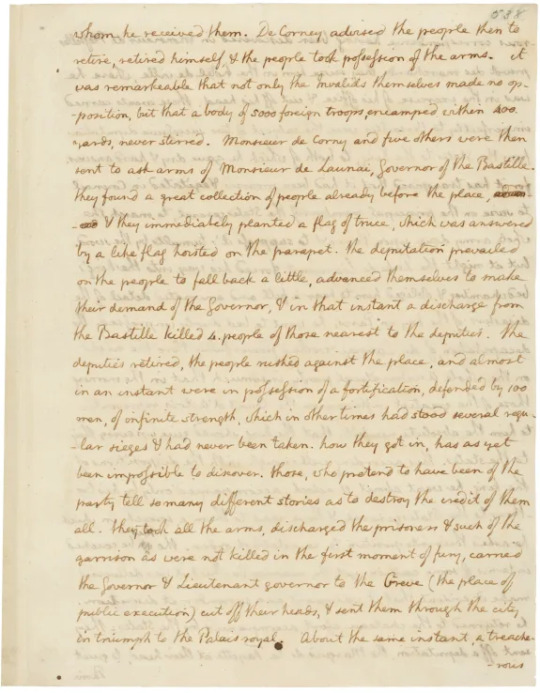
"The deputies retired, the people rushed against the place, and almost in an instant were in possession of a fortification, defended by 100 men, of infinite strength..."
• Ambassador Thomas Jefferson report on the events on 14 July 1789.
The excerpt shown here is from a letter in Jefferson’s own hand to Secretary of Foreign Affairs John Jay. In great depth, he describes the events of July 14, 1789, including the storming of the Bastille in Paris. The Bastille was a symbol of the old regime, and housed arms, gunpowder, and prisoners.
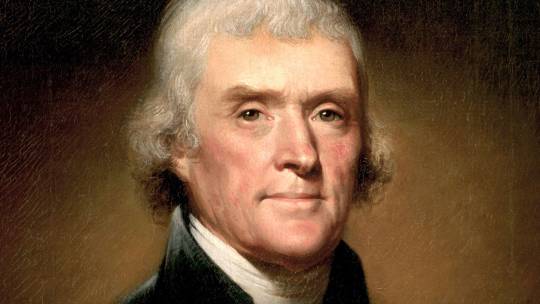
On 14 July 1789, the U.S. Ambassador to France, Thomas Jefferson, was a witness to the events of a day in Paris that is commonly associated with the beginning of the French Revolution. Jefferson recorded the events of the day in a lengthy and detailed letter to John Jay, then Secretary of Foreign Affairs.
The American Revolutionary War began as a conflict between the colonies and England. In time, what began as a civil disturbance turned into a world war drawing France, Spain, and the Netherlands into the hostilities. France would send troops, ships, and treasure to support the American effort. During the war, one of the first priorities of the French government and its allies was to raise funds to fight the war.
When the Treaty of Paris was signed in 1783, France was virtually broke and on the edge of social catastrophe, the result of decades of war with England and other countries. The poor suffered hunger and privation. By 1789, revolution would come to France.

In 1785, Thomas Jefferson arrived in Paris to replace Benjamin Franklin, who was retiring as ambassador to France. At the age of 81, Franklin returned to the United States where he would serve as President of the Pennsylvania Assembly and also participated in the Constitutional Convention of 1787.
John Adams was reassigned to London where he would be the first American ambassador to the Court of St. James. Jefferson remained on duty in France until late 1789 when he returned to the United States. While in France, Jefferson reported on developments at the court of King Louis XVI, the country at large, and the rest of Europe.
Jefferson was sympathetic to the revolution, opening his home in Paris to its leaders and assisting his friend the Marquis de Lafayette with drafting the Declaration of the Rights of Man. As the first Secretary of State under the Constitution and George Washington, his support for France and the revolution continued.
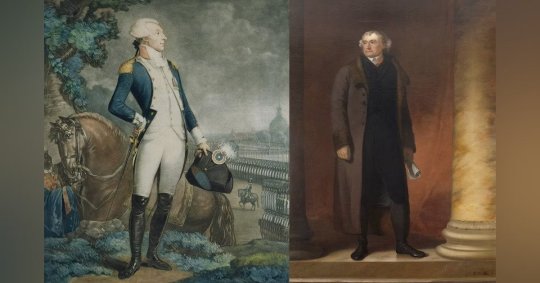
His friendship to the Marquis de Lafayette, who served in the War of Independence and lived almost 10 years in the USA, became very important in the beginning of the French revolution. The Marquis was the General of the french forces 1789 and tried to prevent a civil war and turmoil. He corresponded with Jefferson, who came from a country with the same experiences. Jefferson and the Marquis agreed that France was not mature to become a republic but a constitutional monarchy, like in Great Britain. However, this was the decision of the national assembly, of which the Marquise was a member. Jefferson went daily to Versailles to inform himself about the decisions. During Jefferson’ s visits, they passed the following laws:
1. Freedom of the person by habeas corpus 2. Freedom of conscience 3. Freedom of the press 4. Trial by jury 5. A representative legislature 6. Annual meetings 7. The origination of laws
This totally fit to Jefferson’s principles. In addition, there was passed a bill, which was prepared by Lafayette and Jefferson and which abolish any title or rank to make all men equal.
Thomas Jefferson also helped his friend Lafayette to bring the different opinions in his party about the constitution to an agreement. France should become a constitutional monarchy.
However, after this, Jefferson recognised that he is not allowed to interfere in the French domestic affairs and that he should be neutral and represent his country. He left France in the thinking that the Revolution was over and that France would grow to a constitutional monarchy. Jefferson was proud of the achievements in France and after his return to USA he declared: “ So ask the travelled inhabitant of any nation, In what country on earth would you rather live? - Certainly, in my own where are all my friends, my relations, and the earliest and sweetest affections and recollections of my life. Which would be your second choice? France."
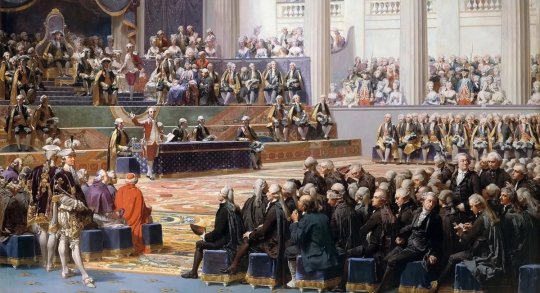
For all his francophile fervour, as the chief American diplomatic representative, Jefferson’s Enlightenment had been a conventionally English one, dominated above all by John Locke. And Jefferson’s first impressions of America’s principal ally in the Revolution were not positive ones. “The nation,” he confided to Abigail Adams in 1787, “is incapable of any serious effort but under the word of command.”
The stars of the French Enlightenment - Voltaire, Diderot, d’Holbach - were frivolous and useful only for manufacturing “puns and bon mots; and I pronounce that a good punster would disarm the whole nation were they ever so seriously disposed to revolt.”
The events of the spring of 1789 soon changed all of that before Jefferson’s very eyes. “The National Assembly,” he excitedly wrote to Tom Paine, “having shewn thro’ every stage of these transactions a coolness, wisdom, and resolution to set fire to the four corners of the kingdom and to perish with it themselves rather to relinquish an iota from their plan of a total change of government” had excited Jefferson’s imagination as nothing before.
Even when the Paris mob seized the Bastille and beheaded the hapless officers of the Bastille, Jefferson shrugged it aside as a mere incident, since “the decapitations” had accelerated the king’s surrender. As Jefferson would write later, “in the struggle which was necessary, many guilty persons fell without the forms of trial, and with them some innocent.” But rather than seeing the French Revolution fail, “I would have seen half the earth desolated. Were there but an Adam and an Eve left in every country and left free, it would be better than as it now is.”

Jefferson’s admiration for the French Revolution seemed to increase in direct proportion to his distance from it. And once he returned to America at the end of 1789, one of his chief motives for taking the post of Secretary of State was to observe and encourage the French eruption, when the National Assembly seized and redistributed the lands of the Catholic Church, when the king foolishly attempted to flee France, only to be captured, placed on trial and executed.
And when a Committee of Public Safety began a national purge - the “reign of terror” - Jefferson continued to describe the French Revolution as part of “the holy cause of freedom,” and sniffed that “the tree of liberty must be refreshed from time to time with the blood of patriots and tyrants. It is its natural manure.”
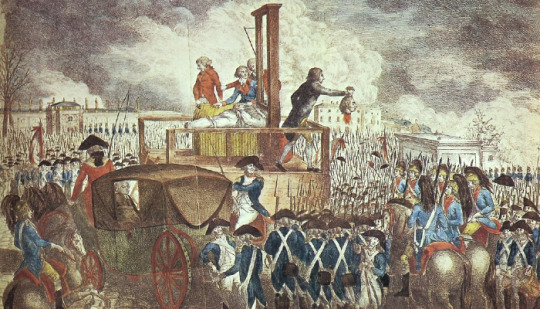
There is no question that Jefferson’s influence in the beginning of the French Revolution was very important. His initial moderate counsels and ideas helped in the beginning to prevent a civil war. His opinion that France was not mature to become a republic is probably right, because after 600 years of monarchy and aristocracy they people were not used to have any rights or take part in political matters. Jefferson thought that a republic had to develop from a constitutional monarchy. When you look to the cruel end of the French Revolution, Jefferson’s assessment was right up to a point.
Jefferson’s time as Secretary of State coincided with the most explosive phase of the French Revolution. What started as an attempt to dismantle the Ancien Régime and institute a constitutional monarchy blossomed into a radical experiment in creating an entirely new republican society. As his correspondence with Minister to France Gouverneur Morris and Minister to the Netherlands William Short during the emergence of the Jacobin Terror reveals, Jefferson responded to the violent radicalisation of the Revolution with enthusiastic support.
His advocacy for the French Revolution did not signify his emergence as a disruptive insurrectionist in favour of purposeless violence, anarchy and unbridled populism. Instead, he advocated for recognition and support of the Jacobin government as a successful international analog to the republican project he wanted to pursue at home at the expense of the “monarchical” aspirations of Hamilton and the Federalists.
In practice, the parallels he imagined between the ideal Jeffersonian and Jacobin republics were usually more apparent than real, as Jefferson often ignored the reports of Morris and Short in favour of fanciful idealising of his French counterparts – a problem Jefferson would only come to grips with in retirement.
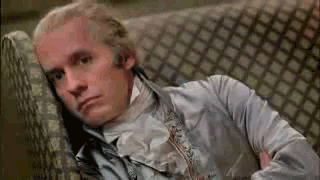
Despite these dilemmas, Jefferson’s impassioned advocacy for the French Revolution proved effective, emerging as a cornerstone of the burgeoning Republican Party’s foreign policy and remaining important well into the early nineteenth century, until the Revolution ceased to be an important political issue. It was not until he became President in 1801 that Jefferson’s views toward France began to cool and became more pragmatic, highlighted by the Louisiana Purchase Treaty.
#thomas jefferson#jefferson#french revolution#14 july 1789#bastille day#america#france#french#monarchy#republic#history#politics#ideology#jacobin#essay#diplomacy#ambassador#jefferson in paris#paris
65 notes
·
View notes
Text

Kim Seokjin for Maison FRED Paris jewelry brand 2024
New brand ambassador 👏🏻
#kim seokjin#jin#jin bts#bts#fred paris#fred jewelry#ambassador#photography#photshoot#visual#world wide handsome#french brand#korean#july 2024
11 notes
·
View notes
Text
His 'merciful inclination and princely heart' meant he was always ready to 'take pity and compassion on all offenders repentantly crying'. In the case of his daughter, since she was, 'frail, inconstant and easy to be persuaded,' he would be glad to remit some of his displeasure.
The King’s Pearl: Henry VIII & His Daughter Mary, Melita Thomas
#i don't totally agree with the author on all points but she does really use the evidence well to demonstrate#the sort of current of uneasiness that ran through this relationship#the line is always that she's 'easy to persuade' but it's a double edged sword#if she's easy to persuade then it necessitates that there's someone persuading her#and that they will be punished. and it's this period we see her supporters arrested and interrogated and dismissed from the privy council#and as she's speculated henry did not really that believe that#but he wanted to believe that. that she was solely acting on the instructions of others. manipulating her for that purpose#melita thomas#marians are very weird about this relationship tho i have noticed#either all of the above is obfuscated (...referring to her as frail inconstant etc is horrible for lack of better word#altho 'frail' is in keeping with the misogyny of the culture and how women were regarded. and honestly it's not that surprising if you're#familiar with sources beyond chapuys. the french ambassador believed he 'hated her thoroughly')#and she's his 'favorite'#or he's blamed for being 'abusive' for things that don't really qualify as abuse...?#like mary remaining unwed throughout her twenties#was more a matter of political-religious tension and separate parties unable to come to agreement#than any spite on his part towards her
7 notes
·
View notes
Text
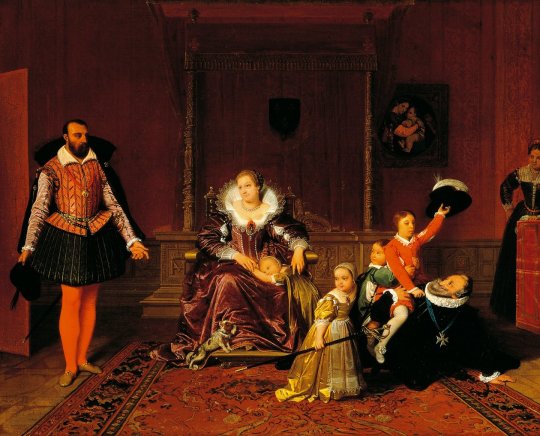
Henry Iv Surprised by the Spanish Ambassador While Playing with His Children
Artist: Jean-Auguste-Dominique Ingres (French, 1780–1867)
Title: Henry IV Receiving the Spanish Ambassador
Date: 1817
Medium: Oil on canvas
Collection: Petit Palais, Paris, France
Description
Henry IV Receiving the Spanish Ambassador depicts Henry IV of France playing with his children whilst receiving the Spanish ambassador, with Marie de Medici seated at the centre.
#group portrait#oil on canvas#henry IV of france#family#spanish ambassador#playtime#leisure#marie de medici#french monarchy#french empire#french history#men#servant#children#jean auguste dominique ingres#french painter#french culture#french art
5 notes
·
View notes
Text
1 2 3 … Doucka !
The rare gem that Disney was looking for turns out to be Bojidarka Esposito, who everyone nicknames Douchka :

Her audition convinced the company so strongly that they signed her for 10 years !!
The success will be almost immediate , her first album sold more than 152,000 copies in less than three months
youtube
youtube
youtube
youtube
youtube
youtube
Despite her success (which lasted 7 years) Douchka will eventually tire of Disney and her image of a perfect little girl, she decides to change direction and breaks her ties with Disney .
Since her divorce from the firm, she only performs her old hits on very rare occasions like here in 2012 :
youtube
This departure will not disturb the company (which undoubtedly felt the end coming, Douchka becoming too old for her audience) and a new casting to immediately look for a replacement is launched…
Part 3 :
#douchka#disney france#french disney#ambassador#The Great Mouse Detective#zorro#disney's zorro#mickey mouse#donald duck#davy crockett#zorro 1957#ambasador#80s disney
4 notes
·
View notes
Text


#henry viii#henry the eighth#tudor era#tudor history#Charles de Marillac (the French Ambassador) to Anne de Montmorency Grand Master of France#that letter is a doozy#charles de marillac
2 notes
·
View notes
Text
The oblong gilt frame disposed its enclosing lines; the poplars and willows, the reeds and river—a river of which he didn't know, and didn't want to know, the name—fell into a composition, full of felicity, within them; the sky was silver and turquoise and varnish; the village on the left was white and the church on the right was gray; it was all there, in short—it was what he wanted: it was Tremont Street, it was France, it was Lambinet. Moreover he was freely walking about in it.
The Ambassadors by Henry James

Le Pecheur [The Fisherman] by Émile Lambinet
#Strether's train voyage into the French countryside has bewitched me body and soul actually#am reading#The Ambassadors#Henry James#Émile Lambinet
3 notes
·
View notes
Text
@frxncaise // continued.
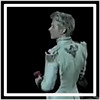
“I can imagine it. Well you simply must find a moment to see the sights on your own terms. It is not Paris, but it is charming in its own way,” he says, his eyes following the sweep of the dancers through the center of the room. “How long are you to stay with us in Moscow? I have the vague idea your father is in politics, isn’t that so? Well I don’t know a thing about all that and I don’t see much point in learning, but I do wonder what can he possibly be up to here, things being how they are with the war they tell us is still going on, somewhere.” Anatole Kuragin spoke of war as he might speak of the weather. How could he do otherwise, when it meant so little to him and his life here in the city? Truth be told, he never thought of it, and only did so now because he was confronted with the daughter of the French ambassador. If any of that nonsense with Napoleon were ever going to interest him, it would certainly be in proximity to a pretty, young French girl.
#had to move this thread to a new post for the beta editor but ANYWAY#anatole doesn't actually care about politics he just can't help thinking there must be something spicy going on if the ambassador is here#AND with family. what are the french thinking......#frxncaise#v; chandeliers and caviar#||x i have long wished to have this happiness [ queue ]
2 notes
·
View notes
Text

War orphans greeting the US Ambassador in the Tuileries Gardens of Paris in 1920
French vintage postcard
#postkaart#ambassador#carte postale#briefkaart#french#greeting#orphans#paris#1920#old#war#sepia#us#postkarte#vintage#gardens#postal#photography#ephemera#tuileries gardens#tuileries#postcard#tarjeta#photo#ansichtskarte#historic
4 notes
·
View notes
Text















Pam Courson footage filmed in 1970 in LA.
This part of the video shows Pam walking in the garden, presumbly filmed as well in 1970.
This video was aired on French TV in the 90s (Canal +) under the title “Memories of a French Ambassador”.
This great quality video was uploaded in Vimeo but later it was taken down, so luckily we could download it and share it here.
Watch the full Video
#Pam Courson#Pamela Courson#1970 Pam#Pam muse#muse#model#boutique owner#fashion designer#editor#babysitter#Memories of a French Ambassador
7 notes
·
View notes
Note

this is how my dad eats croissants. i need to know from av actual French person is this even legal
im fuming.... the blood of my ancestors boils in my veins.... WHAT IS THIS.
na, for real, it's a legit way. some people in France eat it sandwich-like, with ham butter cheese tomato and salad in it. i think most of us don't agree with this kind of abomination though
back to your father, just some cheese and tomatoes in it (from what i see) is fine and actually tasty i guess. go off blue dad! but next time try just dipping it in coffee or hot chocolate during breakfast and put your cheese and tomatoes in some good baguette, as god intended
#french propaganda#ask#thanks for the ask blue!!#frens#rambling#i love to be the ambassador of my country
3 notes
·
View notes
Note
Is it true Anne Boleyn was described as pretty and beautiful by people at the time, but for some reason the idea she was kind of average won out, for some reason? Thanks.
HTF has sort of made this argument, although the truth is her appearance was spoken of variously, but not often in unequivocally negative terms by contemporaries (at worst we have Chapuys' 'thin and old', but this was a mere two years after describing her as of 'a state of health and of an age to have many more children', so...pinch of salt?), even the descriptive quote usually used of 'comparative beauty' to her with Elizabeth Blount is not entirely clear (the usual description of the quote is 'even her chaplain' said Anne was the lesser beauty, but going back to the primary source that doesn't seem to be the case:
Asked him if he knew these two ladies, and whether they were beautiful, worth leaving his wife for. He said he knew them both, and the mother of his son was eloquent, gracious, and beautiful, but the other lady was more beautiful still.
"Once Henry had decided to divorce Katherine of Aragon, fuller descriptions would follow. The first was in February 1528, when Lodovico Ceserari, the Duke of Milan's agent in Paris, assured the Venetian Signoria that she was 'very beautiful' (bellissima). The French diplomat Lancelot de Carle, who first saw her after his arrival in England in May 1535, agree[d] [she was] [...] 'beautiful and had an elegant figure'." Hunting the Falcon: Henry VIII, Anne Boleyn & the Marriage That Shook Europe, John Guy & Julia Fox
The Sanuto quote that is usually trotted out also seems to be a case of mistranslation and not properly assessed, although his remark was that she was 'not one of the most beautiful women in the world', given that he was politically and religiously opposed, his remark is interesting in that he combines an account of her physical appearance with a judgement about her power, and compares it to her predecessor:
"[...]her eyes, which are black and beautiful and exert a greater effect on servants than the Queen's when she was in her prime.'" Hunting the Falcon: Henry VIII, Anne Boleyn & the Marriage That Shook Europe, John Guy & Julia Fox
#anne boleyn#anon#it 'won out' bcus of sanders and because contemporary reports are mixed? i suppose#weir and borman definitely popularized it#they have misquoted that account as chapuys calling her 'that thin old woman'#sometimes they even credit it to a 'french ambassador' who does not seem to exist
13 notes
·
View notes
Text
on one hand I don't trust a man who is super into Napoleon, however I am a man super into learning about Napoleon because I think his life and personality is so fucking funny
#like he was an AWFUL person#but at the same time#he also ate the same “safe” meal everyday#but would eat it so fast he would get a tummyache#and lay on his bedroom rug until it went away#and he apparently fucked so good that his second wife who hated him actually began to like him#when he got mad at the russians#he would call the russian ambassador and yell at the poor guy until he got tired#also he was only french on a technicality so he was really the joke#what if an italian man was french
1 note
·
View note
Text
we have no other choice but to stan Eva Green, new ambassador of French culture worldwide👑🇫🇷🥐



#lmao why are they mad? it's true xD#Eva Green is the ambassador we deserve tbh#it reminds me that time when the creative director of Jalouse magazine bitch slapped a crew member during a fashion show bc she didn't like#where she got a seat#and said 'you don't mess with French people' lmaooooo#the energy of chaotic French women>>>>>>>>#papi watch
3 notes
·
View notes